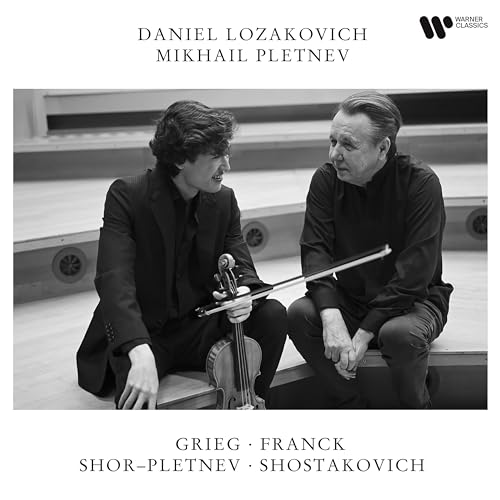
Franck, Grieg, Shor/Pletnev & Shostakovich













℗© A Warner Classics release, 2024 Parlophone Records Limited
Artist bios
The Swedish violinist Daniel Lozakovich emerged as a child prodigy and continued to earn plaudits as a teen, signing with the prestigious Deutsche Grammophon label at the age of 15. Lozakovich was born in Stockholm on April 1, 2001. He was not groomed for music by his parents, neither of whom were musicians, Instead, he was enthusiastic about sports (and has continued to pursue soccer and boxing after reaching world-class levels as a violinist). At age six, Lozakovich was sent to a music school in an attempt to give him a well-rounded set of activities. His attention immediately settled on a violin, and after one lesson, his teacher announced that he had unusual talent. Just two years later, Lozakovich was appearing with the Moscow Virtuosi and their conductor, Vladimir Spivakov. Lozakovich took classes at music schools in Vienna, Karlsruhe (where his teacher was Josef Rissin), and Geneva, making festival appearances around Europe in the summer. He has modeled his playing on that of Jascha Heifetz and Yehudi Menuhin, among others, and another important mentor has been teacher Eduard Wulfson. Soon Lozakovich's playing began to attract the attention of major conductors. The first was one of the most famous of all, Valery Gergiev, who booked Lozakovich for the 2015 New Year's concert of the Mariinsky Theater Orchestra and then for a performance of Beethoven's Violin Concerto in D major, Op. 61. Later came conductors Robin Ticciati, Andris Nelsons, Semyon Bychkov, and Hartmut Haenchen. Deutsche Grammophon signed him to an exclusive contract in 2016, but the young violinist was not in a hurry to release his debut; he added to his repertoire only gradually, cultivated other interests (including popular music and sports), and was busy enough joining a Frankfurt Radio Symphony tour of Japan. Lozakovich's Deutsche Grammophon debut, featuring two Bach violin concertos and a solo violin partita, recorded with the Chamber Orchestra of the Bavarian Radio, appeared in 2018. As of that year, Lozakovich remained a student at the Collège du Léman in Geneva. ~ James Manheim
Reaching the highest level of prominence as both pianist and conductor, Mikhail Pletnev is a major figure on the contemporary Russian musical scene. He is also a prolific composer and a competent amateur violinist.
Pletnev was born on April 14, 1957, in Archangelsk in the far north of what was then the Soviet Union. His family was musical; his father played and taught the bayan button accordion, and his mother was a pianist. When the family moved to Kazan in Russia's Tatarstan region, Pletnev began piano studies with Julia Shaskin. He moved to Moscow at 13 to study at the Moscow Central Music School with Evgeny Timakin, and a Grand Prix at the Jeunesses Musicales International in 1945 proved to be the first in a long series of prizes for the young pianist. At 15, Pletnev moved to the Moscow Conservatory for studies with Yakov Flier, whose teaching propelled him to gold medals in two of the Soviet Union's toughest events, the All-Union Competition in 1977 and the Tchaikovsky Competition in 1978. Pletnev launched a touring career that went fully international as restrictions on Soviet musicians loosened in the 1980s. His fluent, elegant style was sometimes likened to those of Arturo Benedetti Michelangeli and even Vladimir Horowitz. He made his recording debut in 1988 on the Virgin Classics label with Rachmaninov's Piano Concerto No. 1 in F sharp minor, Op. 1, and Rhapsody on a Theme of Paganini, Op. 43, with the Philharmonia Orchestra.
In the late '80s, Pletnev struck up an acquaintance with Soviet head of state Mikhail Gorbachev, who aided him in founding the Russian National Orchestra in 1990; it was the first privately funded orchestra in Russia since 1917. The new orchestra, with Pletnev as conductor and artistic director, was successful from the start. It toured the U.S. in 1992 and 1993. In 1994, he moved to Deutsche Grammophon, recording Rachmaninov's Symphony No. 2 in E minor, Op. 27, as conductor of the Russian National Orchestra. His repertory runs from Scarlatti to Rachmaninov, with whom he is especially identified; he is a superb Mozartian and a strong interpreter of a variety of Russian works, but he rarely performs contemporary music.
From the early '90s forward, Pletnev performed somewhat less often as a pianist, although he continued to record both as a pianist and conductor. He stepped down as the Russian National Orchestra's conductor in 1999 but continues (as of 2022) to hold the position of artistic director and to conduct the group occasionally. In the 2010s, he and the Russian National Orchestra often recorded for PentaTone Classics, and in 2022, he moved to Profil, leading the Russian National Orchestra and violinist Ivan Pochekin in violin concertos by Tchaikovsky and Glazunov. By that time, his recording catalog numbered well over 100 items. ~ James Manheim
Customer reviews
How are ratings calculated?

